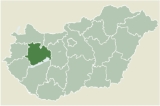
Kovágóörs
Encyclopedia
Kővágóörs is a village in Veszprém county
, Hungary
. It is one of the largest settlements in the Káli basin. It has 914 inhabitants (2001).
Stone was quarried throughout centuries here. Excellent millstones (raw material of bastions and buildings) could be prepared from this kind of stone, thus the first part of the name of the village - "stone cutting" ("kővágó").
Today people call this phenomenon of nature the “sea of stones”.
The second part of the town's name originated from the Örs clan. This area was the clan's principal territory at the time of Árpád’s conquest of Hungary
, accordingly Kővágóörs was seat of “alispán” or “ispán
” (comes
).
Three surrounding medieval villages (Ecser, Sóstókál, and Kisörs) were destroyed at the time of the fall of the Ottoman Empire, and the ruins of their respective churches can be seen nearby.
Here was lived the poet Mihály Barla
.
Veszprém (county)
Veszprém is the name of an administrative county in Hungary. Veszprém is also the name of the capital city of Veszprém county.-Veszprém county:...
, Hungary
Hungary
Hungary , officially the Republic of Hungary , is a landlocked country in Central Europe. It is situated in the Carpathian Basin and is bordered by Slovakia to the north, Ukraine and Romania to the east, Serbia and Croatia to the south, Slovenia to the southwest and Austria to the west. The...
. It is one of the largest settlements in the Káli basin. It has 914 inhabitants (2001).
History
Kővágóörs is landscape protection area, built on a unique geological formation, the fossil sand hill of the Pannon-age Sea.Stone was quarried throughout centuries here. Excellent millstones (raw material of bastions and buildings) could be prepared from this kind of stone, thus the first part of the name of the village - "stone cutting" ("kővágó").
Today people call this phenomenon of nature the “sea of stones”.
The second part of the town's name originated from the Örs clan. This area was the clan's principal territory at the time of Árpád’s conquest of Hungary
History of Hungary
Hungary is a country in central Europe. Its history under this name dates to the early Middle Ages, when the Pannonian Basin was colonized by the Magyars, a semi-nomadic people from what is now central-northern Russia...
, accordingly Kővágóörs was seat of “alispán” or “ispán
Ispan
Ispan is a town in north-western Tajikistan. It is located in Sughd province.-External links:*...
” (comes
Comes
Comes , plural comites , is the Latin word for companion, either individually or as a member of a collective known as comitatus, especially the suite of a magnate, in some cases large and/or formal enough to have a specific name, such as a cohors amicorum. The word comes derives from com- "with" +...
).
Three surrounding medieval villages (Ecser, Sóstókál, and Kisörs) were destroyed at the time of the fall of the Ottoman Empire, and the ruins of their respective churches can be seen nearby.
Here was lived the poet Mihály Barla
Mihály Barla
Mihály Barla Slovene Miháo Barla Slovenian evangelic pastor, writer and poet.Born in Murska Sobota. Studied in Sopron, in the Evangelic Lyceum, by 1803 studied in the University of Jena....
.
Sights
- The village has two churches: the older one nowadays used by Lutheran people was built in 1264 and was renovated in Baroque style in the 18th century; the Baroque Catholic church built in front of the Lutheran one was consecrated in 1802.
- The “sea of stones” (read more about it in the history of Kővágóörs)
- Museum of Bajcsy-Zsilinszky EndreEndre Bajcsy-ZsilinszkyEndre Kálmán Bajcsy-Zsilinszky , was an influential Hungarian politician and an important voice in the struggle against German expansion and military policy.-Family history:...
People
- Mihály BarlaMihály BarlaMihály Barla Slovene Miháo Barla Slovenian evangelic pastor, writer and poet.Born in Murska Sobota. Studied in Sopron, in the Evangelic Lyceum, by 1803 studied in the University of Jena....
- Rudolf CzipottRudolf CzipottRudolf Czipott Slovene evangelic pastor and writer in Hungary.- Early life :His father György Czipott writer, pastor and teacher of Hodoš, born near Murska Sobota. Mother Erzsébet Hutter, German descent, daughter of the pastor of Kukmirn . Rudolf's brothers Lajos and József.Rudolf's father dead...
, lived here - Samuel GoldSamuel GoldSamuel Gold was a Hungarian physician, journalist and composer of chess problems.-Biography:...
, a Jewish chess player, born here
Sources
- Somogyi Győző - Szelényi Károly „The Kál Basin by Lake Balaton” 1992
External links
- Hungarian Wikipedia article
- Street map (Hungarian)

